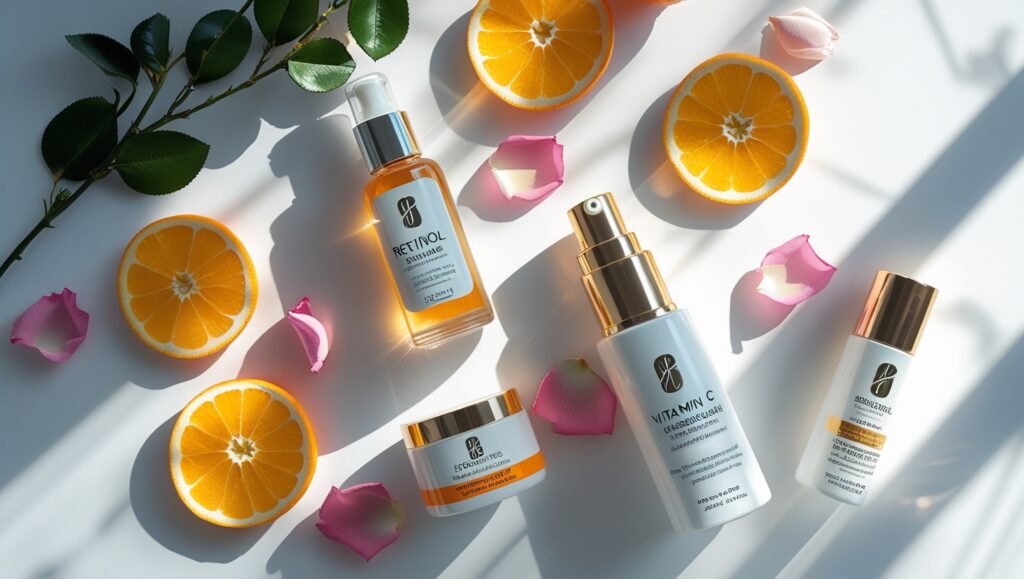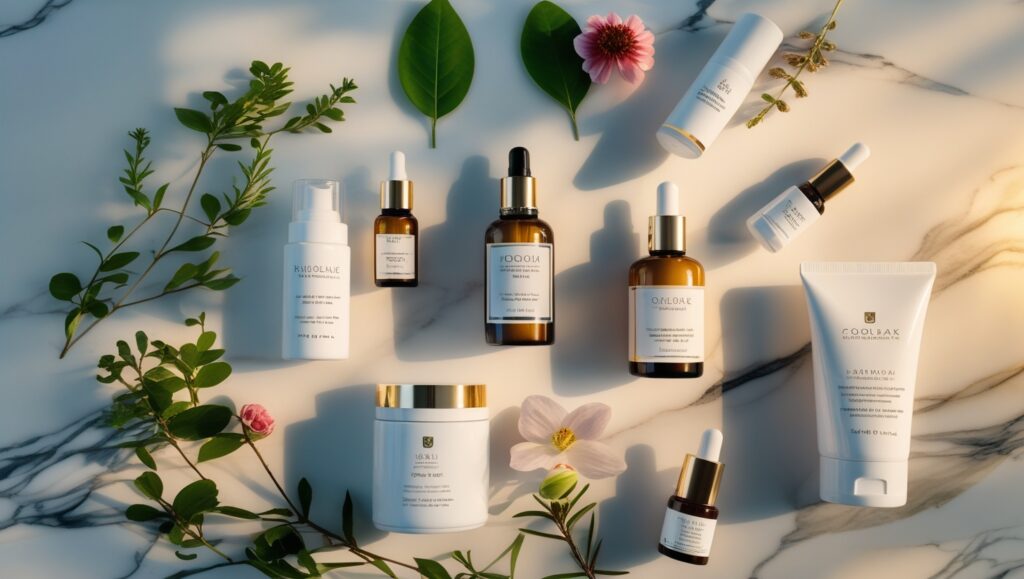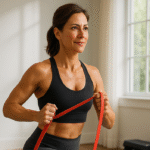We’ve all heard the promises whispered from the beauty counters and shouted from magazine covers: a single, miraculous “anti-aging secret” that will turn back the clock. For years, the answer has been a rotation of the usual suspects: retinoids, Vitamin C, and a stern lecture about sunscreen. And while that advice is absolutely essential—the gold standard for a reason—the true secret to youthful, vibrant skin in today’s world is more nuanced.
The new anti-aging secret isn’t a single product, but a holistic, intelligent approach. It’s about understanding the synergy between cutting-edge ingredients, foundational skincare, and the profound impact of your lifestyle. It’s about moving beyond just treating wrinkles to building resilient, healthy skin from the inside out.
This guide will cover the non-negotiable pillars of any effective anti-aging skincare routine. But more importantly, it will pull back the curtain on the next wave of ingredients and strategies that address aging at a deeper level, giving you the real insider knowledge to create a routine that outsmarts the clock.
Beyond the Basics: The Next Wave of Anti-Aging Ingredients
While retinol remains the undisputed champion, the world of cosmetic science has not stood still. These are the ingredients that are creating a major buzz for their ability to support and enhance the effects of your core routine.
The Power of Peptides: Cellular Messengers

If you think of your skin’s collagen and elastin as its mattress, peptides are the foremen telling the factory to keep producing more. These short chains of amino acids are cellular messengers that signal your skin to perform specific jobs.
- What they do: Different peptides have different functions. Some signal collagen production (hello, firmer skin!), others help relax facial muscles (a “Botox-like” effect), and some improve hydration and skin barrier function.
- Why they’re a secret weapon: Peptides are highly specific and generally very well-tolerated, making them a perfect partner for more aggressive actives like retinoids. They work to rebuild what time—and potent actives—can break down, making your entire routine more effective.
- Look for: Products containing Matrixyl 3000, Argireline, or copper peptides.
Growth Factors: The Cellular Repair Crew
Growth factors are proteins that play a critical role in cell regeneration and repair. In skincare, these are often bio-engineered in labs to be nature-identical, and they act as the ultimate repair crew for your skin.
- What they do: They stimulate cell turnover and the production of collagen and elastin, leading to improved skin texture, thickness, and a reduction in the appearance of fine lines and wrinkles.
- Why they’re a secret weapon: While retinoids accelerate skin turnover, growth factors help ensure the new cells being produced are healthy and robust. They are particularly effective for healing, reducing redness, and restoring a youthful density to mature skin.
The Gut-Skin Axis: A New Frontier
One of the most exciting frontiers in anti-aging research is the “gut-skin axis”—the proven connection between the health of your digestive system and the health of your skin. An imbalanced gut microbiome can lead to inflammation, which is a key driver of aging throughout the body, including the skin.
- What it means for your skin: Inflammation from the gut can manifest as acne, eczema, rosacea, and a breakdown of collagen.
- The secret weapon: Incorporating probiotics (found in yogurt, kefir, kimchi) and prebiotics (found in garlic, onions, bananas) into your diet can help balance your gut, reduce inflammation, and promote clearer, calmer, and more resilient skin. This is true inside-out beauty.
Mastering the Anti-Aging Essentials

New ingredients are exciting, but they are meant to support, not replace, the foundational pillars of any anti-aging strategy. Think of these as the non-negotiable cornerstones of your skincare routine.
Retinoids Revisited: The Undisputed Gold Standard
There’s a reason every dermatologist recommends retinoids (the umbrella term for all Vitamin A derivatives, including retinol). They are the most studied, most proven topical ingredient for reversing the signs of photoaging.
- What they do: Retinoids work by binding to receptors in your skin cells, speeding up cell turnover, boosting collagen production, and fading hyperpigmentation. This process smooths fine lines and wrinkles, improves skin texture, and creates a more even skin tone.
- How to use them: Start low and go slow. Begin with an over-the-counter retinol 2-3 nights a week and gradually increase as your skin builds tolerance. Always use them at night, as they can be degraded by sunlight, and always, always wear sunscreen the next day.
The Antioxidant Army: Led by Vitamin C
If retinoids are your nighttime repair crew, antioxidants are your daytime defense shield. They work by neutralizing free radicals—unstable molecules generated by UV rays, pollution, and other stressors that damage cells and accelerate aging.
- Vitamin C (L-Ascorbic Acid): This is the king of antioxidants. It not only protects the skin but also helps brighten it and is essential for collagen synthesis. A good Vitamin C serum is a must-have for any morning routine.
- Beyond Vitamin C: Don’t stop there! Look for products that also contain Vitamin E, Ferulic Acid (which stabilizes and boosts the effectiveness of Vitamins C and E), Niacinamide, and Resveratrol. A cocktail of antioxidants provides broader protection.
Sunscreen Evolved: Your Daily Insurance Policy
If you use only one anti-aging product, it must be sunscreen. Sun exposure is responsible for up to 80% of the visible signs of aging.
- What it does: Prevents the breakdown of collagen, the formation of wrinkles, and the development of dark spots.
- The modern approach: Today’s best sunscreens do more than just block UV rays. Look for “broad-spectrum” formulas that protect against both UVA (aging) and UVB (burning) rays. Many now also include ingredients to protect against blue light from screens and infrared radiation. Find a cosmetically elegant formula you love, because the best sunscreen is the one you will wear every single day, without exception.
Your Lifestyle, Your Skincare: A Tailored Approach

You can have the most expensive skincare in the world, but if your lifestyle is working against you, you’re fighting a losing battle. Connecting your daily habits to your skin’s needs is the final piece of the puzzle.
Combating “Stress Skin”
Chronic stress floods your body with the hormone cortisol, which breaks down collagen and can trigger inflammation. If you’re going through a stressful period, your skin needs extra support.
- Your Skincare Rx: Focus on calming, barrier-repairing ingredients. Look for niacinamide, ceramides, and cica (also known as tiger grass). These will help soothe inflammation and strengthen your skin’s defenses.
Fueling Your Glow: The Anti-Aging Diet
What you eat directly impacts your skin’s structure and appearance.
- Eat the Rainbow: A diet rich in colorful fruits and vegetables provides a wide range of antioxidants to fight free radical damage from the inside.
- Healthy Fats: Omega-3 fatty acids (found in salmon, walnuts, and flaxseed) are crucial for maintaining a healthy skin barrier, keeping skin hydrated and supple.
- Limit Sugar: High-sugar diets can lead to a process called glycation, where sugar molecules attach to your collagen and elastin fibers, making them stiff and brittle. This leads to sagging and wrinkles.
Summary: Your New Anti-Aging Blueprint
Forget the idea of a single magic bullet. The real secret to timeless skin is a multi-pronged, intelligent strategy.
- Build Your Foundation: Commit to the proven essentials: a retinoid at night, an antioxidant serum in the morning, and broad-spectrum sunscreen every single day.
- Incorporate the Next Wave: Boost your routine’s effectiveness by adding in targeted ingredients like peptides and growth factors to rebuild and repair.
- Live for Your Skin: Recognize the undeniable link between your diet, stress levels, and sleep quality and the health of your skin. Eat a nutrient-dense diet, manage stress, and prioritize sleep.
- Be Consistent: The most powerful ingredient of all is consistency. A simple routine performed daily will always outperform a complex, expensive one done sporadically.
By embracing this holistic approach, you move from passively reacting to the signs of aging to proactively building strong, healthy, resilient skin that can stand the test of time.
Frequently Asked Questions (FAQ)
Q: At what age should I start using anti-aging products?
The best time to start is now. It’s never too early to begin with preventative measures, chiefly sunscreen. Most dermatologists agree that you can start incorporating antioxidants like Vitamin C in your early 20s and consider adding a gentle, over-the-counter retinol in your late 20s or early 30s, or when you begin to see the first fine lines.
Q: Can I use Retinol and Vitamin C at the same time?
It’s best not to use them at the exact same time. The standard recommendation is to use your Vitamin C serum in the morning (to take advantage of its protective antioxidant properties) and your retinoid at night (as it can make skin more sun-sensitive and is best used for repair during sleep).
Q: How long does it take to see results from a new anti-aging routine?
Consistency is key, and patience is a virtue. With consistent use, you may start to see improvements in skin texture and brightness from antioxidants and moisturizers within 4-6 weeks. For retinoids, it typically takes at least 12 weeks to see a noticeable reduction in fine lines and hyperpigmentation, with results continuing to improve over months of use.



